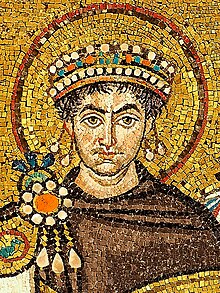
Back Justinianus I van Bisantium Afrikaans Justinian I. ALS Chustinián I AN جستينيان الأول Arabic جستينيان الاول ARZ Xustinianu I AST I Yustinian Azerbaijani بیرینجی ژوستینین AZB Юстыніян I Byelorussian Юстыніян I BE-X-OLD
| Justinian I | |||||||||
|---|---|---|---|---|---|---|---|---|---|
 Detail of a contemporary portrait mosaic of Justinian dressed in a royal purple chlamys and jeweled stemma in the Basilica of San Vitale, Ravenna, AD 547 | |||||||||
| Byzantine emperor | |||||||||
| Reign | 1 April 527 – 14 November 565 | ||||||||
| Coronation | 1 April 527 | ||||||||
| Predecessor | Justin I | ||||||||
| Successor | Justin II | ||||||||
| Co-emperor | Justin I (until 1 August 527) | ||||||||
| Born | Petrus Sabbatius 482 Tauresium, Dardania, Eastern Roman Empire[1] | ||||||||
| Died | 14 November 565 (aged 83) Constantinople, Eastern Roman Empire | ||||||||
| Burial | |||||||||
| Spouse | Theodora (m. 525; d. 548) | ||||||||
| |||||||||
| Dynasty | Justinian dynasty | ||||||||
| Father | Sabbatius (biological) Justin I (adoptive) | ||||||||
| Mother | Vigilantia | ||||||||
| Religion | Chalcedonian Christianity | ||||||||
| Justinian dynasty | ||
|---|---|---|
| Chronology | ||
|
||
| Succession | ||
|
||
Justinian I (/dʒʌˈstɪniən/ just-IN-ee-ən; Latin: Iūstīniānus, Classical Latin pronunciation: [juːstiːniˈaːnʊs]; ‹See Tfd›Greek: Ἰουστινιανός, translit. Ioustinianós, Byzantine Greek pronunciation: [i.ustini.aˈnos]; 482 – 14 November 565),[b] also known as Justinian the Great,[c] was the Roman emperor from 527 to 565.
His reign was marked by the ambitious but only partly realized renovatio imperii, or "restoration of the Empire".[5] This ambition was expressed by the partial recovery of the territories of the defunct Western Roman Empire.[6] His general, Belisarius, swiftly conquered the Vandal Kingdom in North Africa. Subsequently, Belisarius, Narses, and other generals conquered the Ostrogothic Kingdom, restoring Dalmatia, Sicily, Italy, and Rome to the empire after more than half a century of rule by the Ostrogoths. The praetorian prefect Liberius reclaimed the south of the Iberian Peninsula, establishing the province of Spania. These campaigns re-established Roman control over the western Mediterranean, increasing the Empire's annual revenue by over a million solidi.[7] During his reign, Justinian also subdued the Tzani, a people on the east coast of the Black Sea that had never been under Roman rule before.[8] He engaged the Sasanian Empire in the east during Kavad I's reign, and later again during Khosrow I's reign; this second conflict was partially initiated due to his ambitions in the west.
Justinian is regarded as one of the most prominent and influential Roman emperors, and historians have often characterized him as a workaholic who worked tirelessly to expand the Byzantine Empire.[9] One of the most enduring aspects of his legacy was the uniform rewriting of Roman law, the Corpus Juris Civilis, which was first applied throughout Continental Europe and is still the basis of civil law in many modern states.[10] His reign also marked a blossoming of Byzantine culture, and his building program yielded works such as the Hagia Sophia.
- ^ J. B. Bury (2008) [1889] History of the Later Roman Empire from Arcadius to Irene II. Cosimo, Inc. ISBN 1605204056, p. 7.
- ^ PLRE.
- ^ Cameron, Alan (1988). "Flavius: a Nicety of Protocol". Latomus. 47 (1): 26–33. JSTOR 41540754. Archived from the original on 7 March 2023. Retrieved 9 August 2023.
- ^ Abdy, John Thomas (1876). The Institutes of Justinian. Cambridge University Press. p. 21. Archived from the original on 4 November 2023. Retrieved 10 October 2023.
- ^ J. F. Haldon, Byzantium in the seventh century (Cambridge, 2003), 17–19.
- ^ On the western Roman Empire, see now H. Börm, Westrom (Stuttgart 2013).
- ^ Cite error: The named reference
tulane.eduwas invoked but never defined (see the help page). - ^ Evans, J. A. S., The Age of Justinian: the circumstances of imperial power. pp. 93–94
- ^ Woudhuysen, George (24 December 2023). "Restless zeal of the insomniac emperor". The Critic Magazine. Retrieved 4 September 2024.
- ^ John Henry Merryman and Rogelio Pérez-Perdomo, The Civil Law Tradition: An Introduction to the Legal Systems of Europe and Latin America, 3rd ed. (Stanford: Stanford University Press, 2007), pp. 9–11 Archived 8 April 2023 at the Wayback Machine.
Cite error: There are <ref group=lower-alpha> tags or {{efn}} templates on this page, but the references will not show without a {{reflist|group=lower-alpha}} template or {{notelist}} template (see the help page).